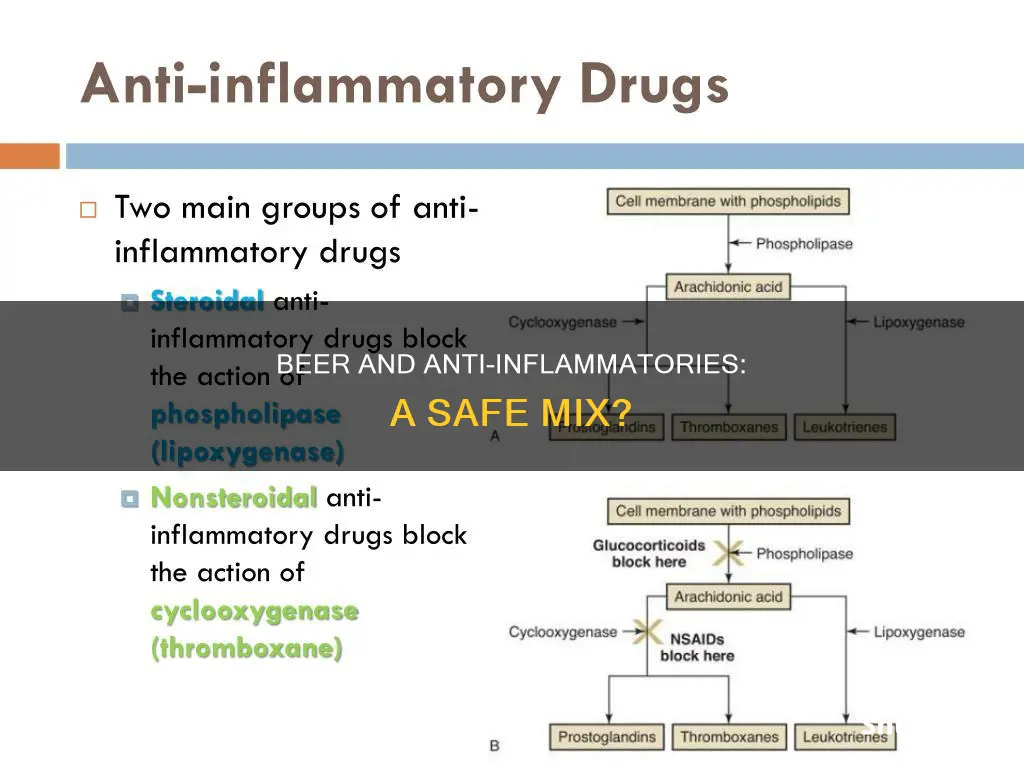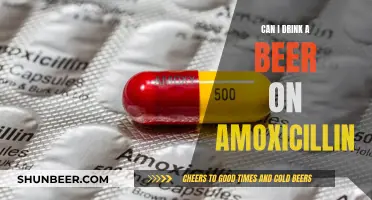
Drinking alcohol while taking anti-inflammatory drugs can be harmful to your health. Alcohol can interfere with the effectiveness of some drugs and intensify their side effects. Nonsteroidal anti-inflammatory drugs (NSAIDs) such as ibuprofen, naproxen, and aspirin are associated with an increased risk of gastrointestinal bleeding and ulcers when combined with alcohol. This risk is heightened for those with underlying medical conditions such as liver or kidney disease, high blood pressure, or heart failure. It is generally recommended to avoid drinking alcohol while taking anti-inflammatory drugs, especially for those with certain medical conditions, to prevent adverse health effects.
| Characteristics | Values |
|---|---|
| Is it safe to mix anti-inflammatory drugs with beer? | It is not recommended to mix anti-inflammatory drugs with beer or any other type of alcohol. |
| Why is it dangerous? | It can cause gastrointestinal bleeding, liver damage, kidney problems, stomach bleeding, gastric/duodenal ulcers, and impaired renal function.) |
| What are anti-inflammatory drugs used for? | They are used to reduce pain, swelling, and fever. |
| Examples of anti-inflammatory drugs | Ibuprofen (Advil, Midol, Motrin), Naproxen (Aleve), Aspirin, Celecoxib (Celebrex), Ketorolac (Toradol) |
What You'll Learn
- Ibuprofen and alcohol can cause gastrointestinal issues
- Mixing anti-inflammatory drugs and alcohol can lead to kidney problems
- Alcohol and anti-inflammatories may cause internal bleeding
- Anti-inflammatory drugs and alcohol can increase the risk of slowed breathing, coma, and death
- Mixing anti-inflammatories and alcohol can be dangerous for those with kidney disease

Ibuprofen and alcohol can cause gastrointestinal issues
Ibuprofen can irritate the lining of the stomach, which can lead to a gastric or intestinal perforation, which can be fatal. The risk of stomach bleeding is greater for those who are older than 60, take a high dosage of ibuprofen, use the drug long-term, take blood-thinning drugs or steroid drugs, or have had stomach bleeding problems in the past.
Symptoms of gastrointestinal bleeding include vomiting blood, black tarry stools, rectal bleeding, abdominal pain or cramps, and an upset stomach that doesn't go away. If you experience any of these symptoms, seek medical attention.
To reduce the risk of gastrointestinal issues, it is recommended to limit alcohol consumption to one drink per day or less and to take the lowest dosage of ibuprofen needed to ease your symptoms. It is also important to follow the instructions on the ibuprofen package and not take the drug for longer than necessary. If you have concerns or are at high risk, consult your doctor.
Beer and CT Scans: What You Need to Know
You may want to see also

Mixing anti-inflammatory drugs and alcohol can lead to kidney problems
Nonsteroidal anti-inflammatory drugs (NSAIDs) are a group of pain relievers that include over-the-counter medications such as ibuprofen, aspirin, and naproxen sodium. NSAIDs are usually safe for occasional use when taken as directed, but they can cause serious side effects if used incorrectly. For example, long-term use of NSAIDs at high doses may harm the kidneys, even in people with normal kidney function. NSAIDs can reduce blood flow to the kidneys, and high doses over a long period can lead to chronic kidney disease and even progressive kidney damage.
Alcohol can increase the side effects of NSAIDs, including the risk of kidney disease. Both alcohol and NSAIDs irritate the stomach and digestive tract, so combining them increases the risk of ulcers and bleeding in the digestive tract. Alcohol can also cause dehydration, making it difficult for the kidneys to filter toxins. This further increases the risk of kidney damage.
People with underlying medical conditions, such as liver or kidney disease, high blood pressure, or heart failure, are at the highest risk of developing kidney problems when mixing alcohol and NSAIDs. It is recommended that people with these conditions do not use NSAIDs, even occasionally, without first consulting their doctor.
To avoid kidney problems, it is important to follow the instructions on the medication label and only take the lowest effective dose for the shortest amount of time. It is also recommended to drink plenty of fluids and avoid dehydration when taking NSAIDs. If you have special risks, your doctor may recommend a safer alternative or order regular tests to monitor kidney function.
Cats and Beer: Is It Safe for Your Feline Friend?
You may want to see also

Alcohol and anti-inflammatories may cause internal bleeding
Nonsteroidal anti-inflammatory drugs (NSAIDs) such as ibuprofen (also called Motrin or Advil) and naproxen (Aleve) are over-the-counter medications that help relieve minor pain and inflammation. They are widely used and often assumed to be safe, but they carry significant health risks, especially when misused. One of the main risks of NSAIDs is their association with internal bleeding in the stomach. When combined with alcohol, this risk increases.
Alcohol and NSAIDs like ibuprofen can irritate the stomach and digestive tract, increasing the risk of ulcers and bleeding from the digestive tract. Heavy drinking can cause additional gut irritation and further increase the risk of internal bleeding. The risk is especially high for people with underlying medical conditions such as liver or kidney disease, high blood pressure, or heart failure.
The National Kidney Foundation advises avoiding alcohol when taking any pain medications, as NSAIDs are linked to impaired renal function and can exacerbate kidney disease when combined with alcohol. Alcohol also increases the risk of liver damage, and even a few drinks per day while taking acetaminophen (commonly found in pain relievers) could result in severe liver injury.
Symptoms of a gastrointestinal (GI) bleed include vomiting blood, black tarry stools, rectal bleeding, and abdominal pain. These symptoms can be exacerbated by consuming alcohol while taking NSAIDs. It is important to be aware of these symptoms and seek medical attention if they occur.
To minimise the risk of internal bleeding, it is recommended to avoid combining alcohol with NSAIDs. If you are taking anti-inflammatories and wish to consume alcohol, it is important to consult your doctor and follow their advice.
Beer and Sore Throats: Relief or Risk?
You may want to see also

Anti-inflammatory drugs and alcohol can increase the risk of slowed breathing, coma, and death
Combining anti-inflammatory drugs and alcohol can have severe health consequences, including slowed breathing, coma, and even death. These risks are especially pronounced when anti-inflammatory drugs are taken with opioids or benzodiazepines.
Nonsteroidal anti-inflammatory drugs (NSAIDs) such as ibuprofen (Advil, Motrin) and naproxen (Aleve) are commonly used to relieve minor pain and inflammation. While these medications can be effective, they come with some significant health risks, particularly when misused or combined with other substances like alcohol.
When NSAIDs are taken with alcohol, the potential side effects of both substances are exacerbated. For example, NSAIDs are associated with an increased risk of internal bleeding in the stomach, and consuming alcohol with these drugs can further irritate the gut and increase this risk. Additionally, NSAIDs are linked to impaired renal function, and drinking alcohol while taking them can exacerbate this issue, especially for those with kidney disease.
The dangers of mixing anti-inflammatory drugs and alcohol extend beyond physical health risks. Alcohol can alter the metabolism and pharmacological effects of medications, changing how they are absorbed and metabolised by the body. This can lead to a range of adverse events, including falls, driving accidents, and fatal overdoses.
The combination of alcohol with certain medications, particularly those with sedative effects, can be deadly. Opioids and benzodiazepines, when combined with alcohol, can have synergistic effects on brain circuits involved in vital physiological functions, including respiratory suppression. This can lead to extremely slowed breathing, coma, and even death.
It is important to note that the risks associated with mixing anti-inflammatory drugs and alcohol may vary depending on individual factors such as age, medical history, and the specific medication and alcohol consumption levels. However, in general, it is advisable to avoid combining these substances to prevent potentially serious health complications.
Brown Bag Beer: Is Drinking in Public Legal?
You may want to see also

Mixing anti-inflammatories and alcohol can be dangerous for those with kidney disease
Alcohol can cause changes in kidney function, making it more difficult for the kidneys to filter blood and maintain water balance in the body. This can lead to dehydration, which can have harmful effects on kidney health. Additionally, alcohol consumption can increase the risk of high blood pressure, which is a common cause of kidney disease.
Anti-inflammatory drugs, also known as nonsteroidal anti-inflammatory drugs (NSAIDs), are commonly used to treat pain and inflammation. While these medications can be effective, they come with their own set of risks, especially when combined with alcohol. NSAIDs are associated with an increased risk of gastrointestinal issues, including bleeding, ulceration, and perforation of the stomach or intestines. This risk is heightened when alcohol is consumed simultaneously.
For individuals with kidney disease, the combination of anti-inflammatories and alcohol can be particularly harmful. NSAIDs can further decrease renal blood flow, leading to acute kidney injury, sodium retention, edema, hypertension, and hyperkalemia. The risk of kidney damage is also increased for those with liver disease, as the liver and kidneys work together to maintain balance in the body. Alcoholic liver disease can indirectly lead to kidney damage and kidney disease.
It is important for individuals with kidney disease to be mindful of their alcohol consumption and to avoid mixing it with anti-inflammatory medications. Consulting a healthcare professional is crucial to understanding the risks and making informed decisions about alcohol consumption and medication use.
Beer and Impotence: Is There a Link?
You may want to see also
Frequently asked questions
It is not recommended to mix alcohol with anti-inflammatory drugs, as it can increase the risk of serious side effects such as gastrointestinal bleeding, liver damage, and kidney problems.
Mixing alcohol and anti-inflammatory drugs can cause gastrointestinal bleeding, liver damage, and kidney problems. Alcohol can also intensify the side effects of anti-inflammatory drugs, such as increased risk of stomach bleeding, fluid retention, and allergic reactions.
It is generally recommended to avoid alcohol while taking anti-inflammatory drugs. However, if you do choose to drink, it is important to drink in moderation and be aware of the potential risks involved.
There are several alternatives to drinking alcohol while taking anti-inflammatory drugs. These include:
- Exercise
- Relaxation techniques
- Massage
- Non-alcoholic beverages







